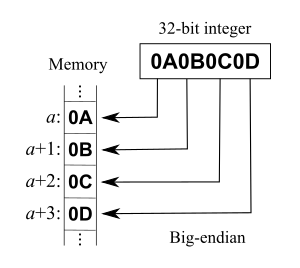endian
English
[edit]Etymology
[edit]0x0A, is stored at the smallest memory address (a), whereas in the little-endian method it is stored at the largest memory address (a+3) (in other words, the least significant byte is stored at the smallest memory address).From end + -ian (suffix meaning ‘one from, belonging to, like, or relating to’ forming nouns, and meaning ‘from, like, or related to’ forming adjectives), originally in the noun Big-Endian coined by the Anglo-Irish author Jonathan Swift (1667–1745) in his novel Gulliver’s Travels (1726). Swift wrote of an emperor of Lilliput who, after his son cuts his finger when opening an egg at the large end, commands his subjects to open them at the small end; those who rebel by opening their eggs at the large end are called “Big-Endians”.[1]
The term was applied in the computing context by the Israeli-American computer scientist Danny Cohen (1937–2019) in 1980.[2]
Pronunciation
[edit]- (Received Pronunciation, General American) IPA(key): /ˈɛn.di.ən/
Audio (Southern England): (file) - Hyphenation: end‧i‧an
Adjective
[edit]endian (not comparable)
- (computing) Preceded by a qualifying word: of a computer: storing multibyte numbers with the most significant byte at a particular memory address; for example, at the smallest address (big-endian) or the largest address (little-endian). [from 1980]
- endian-neutral code
- 1984 August 25, Ian Kaplan, “Inconsistent bit addressing in the 68020: big- AND little-endian”, in net.micro.68k[2] (Usenet):
- In Ken Turkowski's article on the big and little endian addressing used on the 68020 he commented that Motorola's approach "proved" that a machine with consistant[sic] bit addressing (e.g., all little or big endian) was impossible. I assume that he was joking.
Related terms
[edit]Translations
[edit]
|
References
[edit]- ^ [Jonathan Swift] (1726 October 28) “Mildendo, the Metropolis of Lilliput, Described, together with the Emperor’s Palace. […]”, in Travels into Several Remote Nations of the World. […] [Gulliver’s Travels], London: […] Benj[amin] Motte, […], →OCLC, pages 73–75. Swift did not use the term “Little-Endians” in the work.
- ^ Danny Cohen (1980 April 1) “On Holy Wars and a Plea for Peace”, in RFC Editor (IEN (Internet Experiment Note); 137)[1], →ISSN, archived from the original on 20 November 2022:
- The root of the conflict lies much deeper than that. It is the question of which bit should travel first, the bit from the little end of the word, or the bit from the big end of the word? The followers of the former approach are called the Little-Endians, and the followers of the latter are called the Big-Endians.
Further reading
[edit]endianness on Wikipedia.Wikipedia
Anagrams
[edit]Old English
[edit]Alternative forms
[edit]Etymology
[edit]From Proto-Germanic *andijōną (“to end”). Cognate with Old Frisian endia (“to finish”), Old Saxon endiōn (“to come to a stop”), Old High German entōn (“to end”), Old Norse enda (“to end”).
Pronunciation
[edit]Verb
[edit]endian
Conjugation
[edit]| infinitive | endian | endienne |
|---|---|---|
| indicative mood | present tense | past tense |
| first person singular | endiġe | endode |
| second person singular | endast | endodest |
| third person singular | endaþ | endode |
| plural | endiaþ | endodon |
| subjunctive | present tense | past tense |
| singular | endiġe | endode |
| plural | endiġen | endoden |
| imperative | ||
| singular | enda | |
| plural | endiaþ | |
| participle | present | past |
| endiende | (ġe)endod | |
Derived terms
[edit]Descendants
[edit]- English terms suffixed with -ian
- English terms coined by Jonathan Swift
- English coinages
- English 3-syllable words
- English terms with IPA pronunciation
- English terms with audio pronunciation
- English lemmas
- English adjectives
- English uncomparable adjectives
- en:Computing
- English terms with usage examples
- English terms with quotations
- en:Gulliver's Travels
- Old English terms inherited from Proto-Germanic
- Old English terms derived from Proto-Germanic
- Old English terms with IPA pronunciation
- Old English lemmas
- Old English verbs
- Old English class 2 weak verbs

